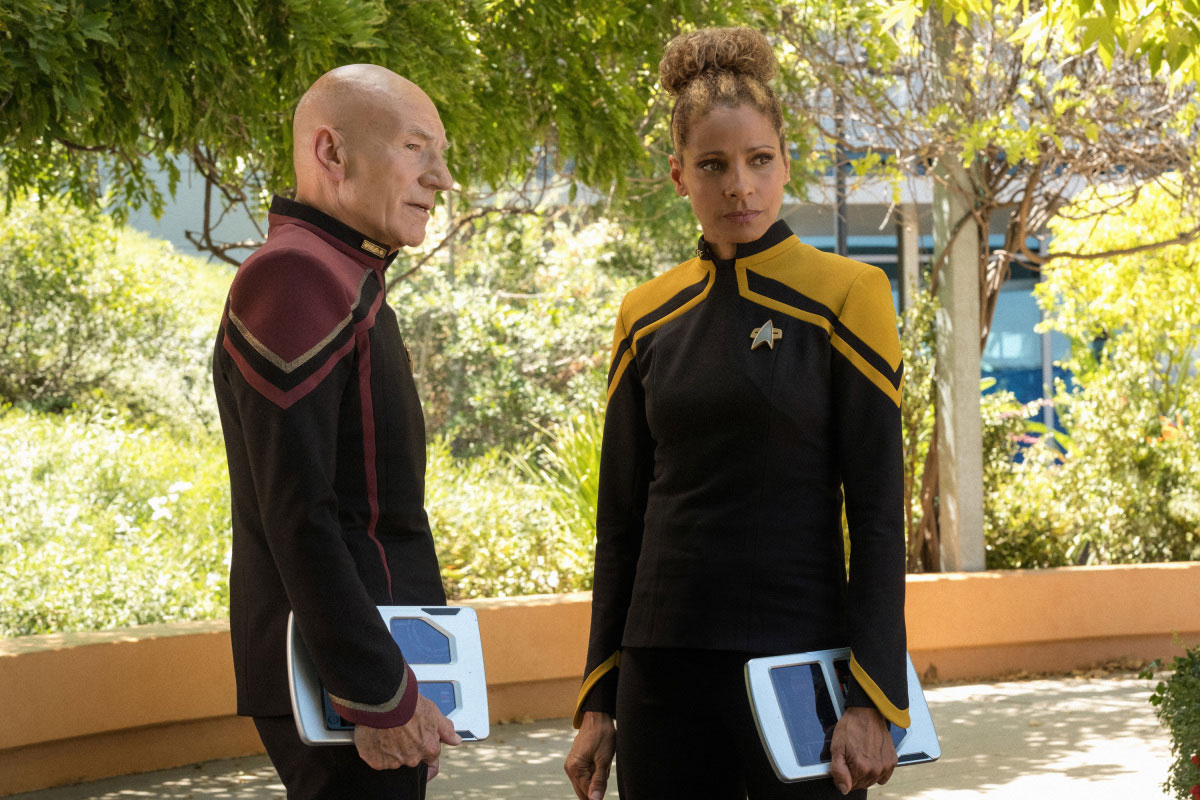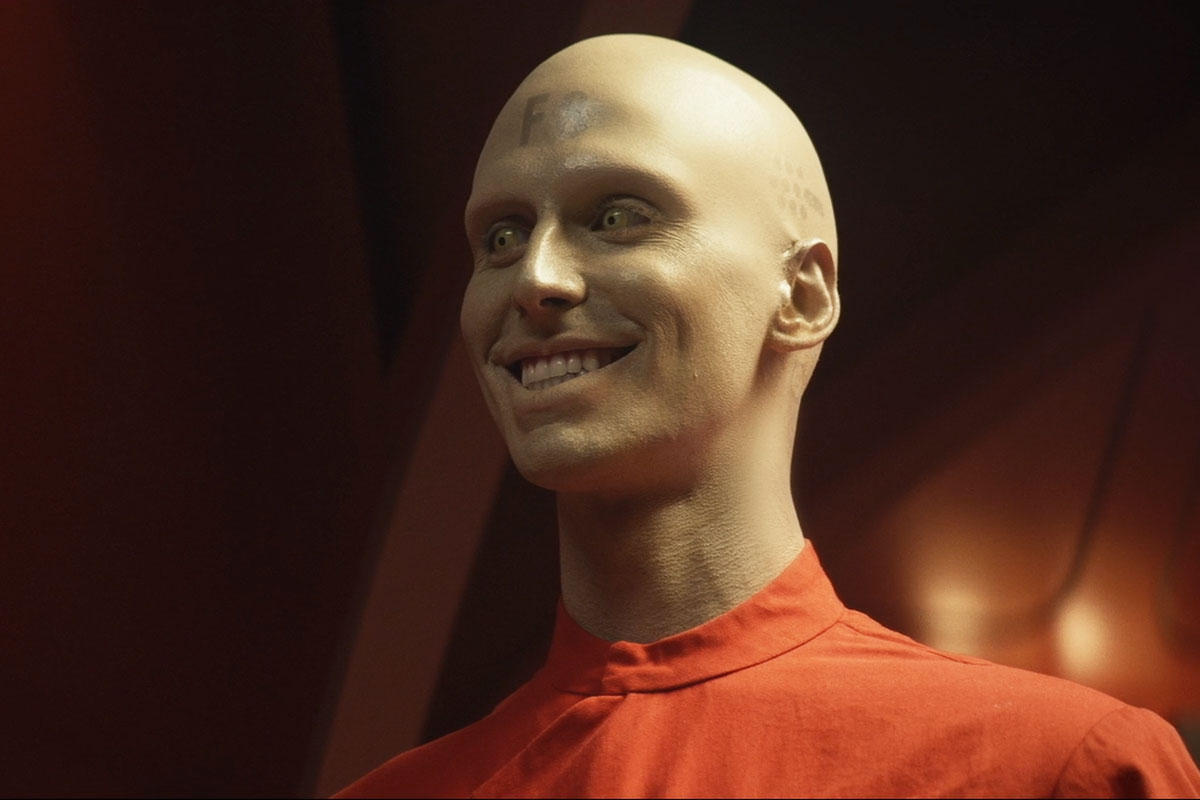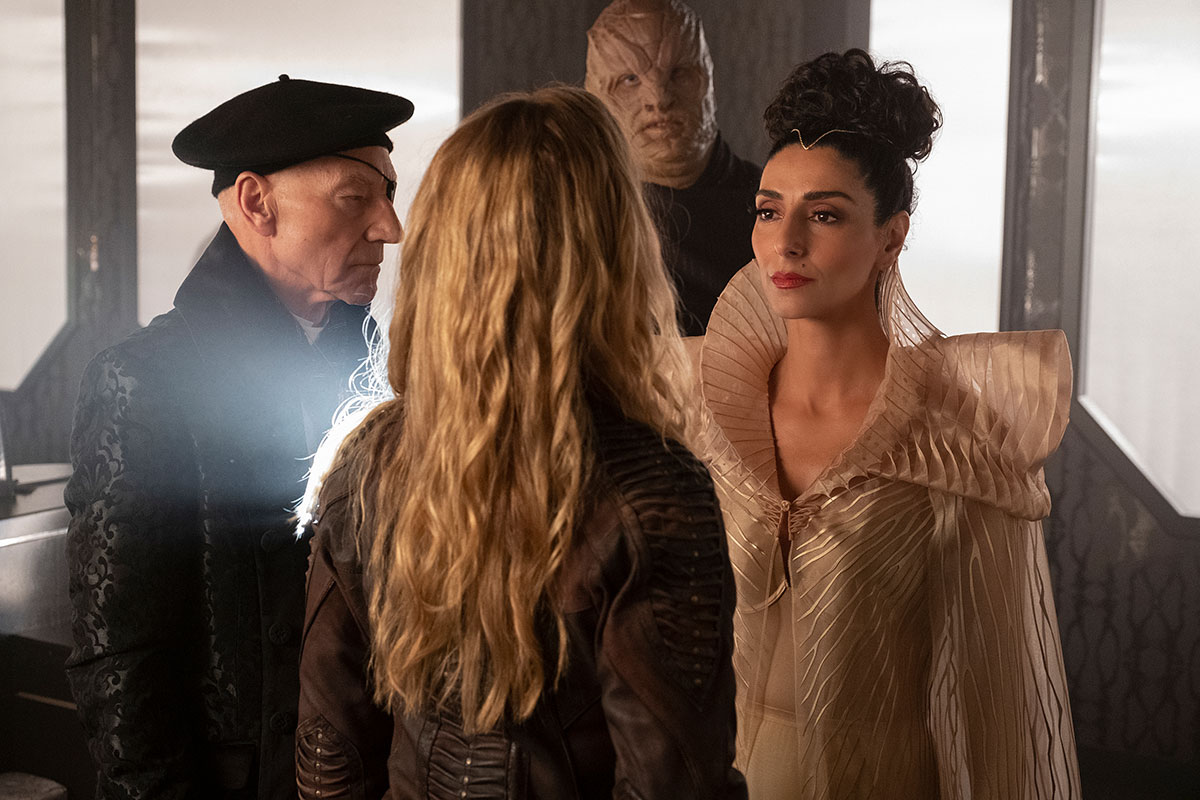In addition to weekly releases of Star Trek: Picard and The Ready Room hosted by Wil Wheaton that we’ve been watching for the last dozen weeks, the folks over at Deadline have also been running a weekly interview series: the official Star Trek: Picard Podcast.
Hosted by Deadline senior editor Dominic Patten, these podcasts have been thoughtful explorations of each episodes, and have given us little nuggets of info and news about each new episode of Star Trek: Picard.
While we’ve found all the episodes of the podcast to be quite fascinating, we’ve pulled out some of the best bits of information from the season’s run for those of you who haven’t been listing along!

The Pressure of ‘Picard’
Sir Patrick Stewart talked about the pressure he felt at the title of show, Picard, and also his idea for an alternate title that his fellow producers did not seem to like very much.
STEWART: I was uneasy about it to begin with, you remember? I felt it was putting me under some pressure to deliver. More than perhaps I wanted to.
But, as the ideas developed, because the choosing the title was quite late in the day. Initially I had proposed it should be ‘Jean-Luc.’ Nobody liked that idea at all…you see, I thought it brought intimacy and connection, and a familiarity.
Why ‘Picard’ Isn’t More Like ‘The Next Generation’
Picard co-executive producer and showrunner Michael Chabon responded to some fans who have criticized Picard for being so different to The Next Generation.
CHABON: That’s what people think they want. And I understand that.
I, as a fan, I remember when TNG premiered. And what I thought I wanted was more TOS. And when I didn’t get that, it took me a while. It took the show a little while too. But I didn’t love it, at all, at first. It took me time, and I had to lose that thing of wanting more Kirk, more Spock, more all the things that I loved about TOS.
And you know, even if we just completely slavishly attempted to recreate TNG now with the entire legacy cast and the Enterprise and they’re going on missions and they’re going to planets, and all the things you think you want when you hear that Patrick Stewart is coming back to play Picard it would disappoint you.
It would of course be a disappointment because you can’t actually have that back again. It’s still there; it hasn’t gone anywhere. You can still watch it and enjoy it. But it would inevitably come as a disappointment.

A Federation That’s Faced Difficult Choices
Franchise showrunner Alex Kurtzman reflected on whether the Federation is morally compromised during the Picard era, a concern often voiced by fans regarding the series.
KURTZMAN: We were sitting in this very room debating how we were going to present the Federation and having really wild fiery debates about that. Do we say that the Federation is bad?
[…]
You can’t make a choice about the Federation to say, “Oh, actually, it’s now corrupt and bad.” If you’re doing that you are fundamentally destroying the essence of what ‘Star Trek’ is. But I think you can say it’s complicated, and diplomacy is complicated, and nation building is complicated, and all the allegories and metaphors that ‘Star Trek’ is.
It’s really difficult to keep that kind of peace. And that’s great drama. I’ve heard that same story from other people – Nick [Meyer] told me that story – and I’ve heard the same story from people who worked on ‘Next Gen,’ who early on were told by Roddenberry that there was never going to be conflict. This is now famous stuff.
Everybody knows this. And it’s impossible to truly create the kind of drama required to evolve ‘Star Trek’ if you stick to that.
Expanding the First Three Episodes
The director of the opening trilogy, Hanelle Culpepper, spoke spoke about the decision to expand the first two episodes into three.
CULPEPPER: I was almost done with my cut of episodes one and two when they decided they wanted to expand it. I think it was partially as [the writers] were going down the season [they] realized a lot of the information that was coming later was better served coming earlier.
Laying more groundwork, and that’s one reason why I ended up directing the first three.

Franchise producer Alex Kurtzman also weighed in on the need to beef up the show’s opening episodes.
KURTZMAN: Yeah, as you say, it’s a complicated plot. I think when you have a complicated plot one of the weird magic trick goals is how do you present all of that information without having it feel like exposition? Having it be presented through character.
And what we started feeling was that there was too much for two episodes. It would have actually felt not only rushed but so top heavy that it would have been too much to process. And we decided that there were actually really natural breaks in the story where it felt like we could expand the story…and take time to add some scenes.
I’ll give you a great example: we had not shown, as we see at the top of episode two, the attack on Mars. They all talked about the attack on Mars; you all saw the emotional and political implications of the attack on Mars. But you never saw it.
And one day, after the trains had already left the station, we said “Oh my God, you’ve got to see the attack.” Otherwise, if you don’t see — and feel — how scary that was you’re actually going to be judging the Federation and thinking they’re terrible.
Because it’s theoretical until you feel it. Once you feel it you go that was terrible, that should never happen again, and now I understand why there’s a ban on synths. I may not agree with it but I understand why. Those kind of things are so important.
As to the question of which parts of episodes one, two, and three were part of the original episodes of added, later Hanelle Culpepper said that the additional scenes are peppered throughout the first three episodes, including that flashback to Picard and Raffi in uniform during “The End is the Beginning.”
CULPEPPER: The addition stuff is peppered throughout. So, there’s a little bit in episode one, there’s a lot in episode two, and I feel like episode three is predominantly what was episode two. I believe it starts with us going to the Dahj’s apartment [the top of episode two.]
or three, going back and seeing the moment that Picard submitted his resignation, and they accepted it, that scene of him telling [Raffi] — that was new stuff. Which actually, originally, was in episode two back in the script phase, and then was taken out, and then brought back when we shot more stuff.

The Admiral’s Alternate Introduction
Alex Kurtzman also described a scene that was filmed but later cut from the series pilot, “Remembrance”:
KURTZMAN: There was a scene we ended up cutting actually, where Picard is out in the fields with Number One, and the introduction of Laris.
He’s looking through a little eyeglass around his vineyard. And he’s surveying it. And he sees the field workers picking the grapes are making fun of Laris’s ears…and she sees it and sort of turns a blind eye — and [Picard] sees it and walks over to them and just takes the guy apart. And he yells and screams at him, and he says if I ever see that happen again you’re gone.
And the funny thing was, as much as it was a really wonderful idea and conceit that Picard would stand up for Laris, it was too early in the introduction to have him be that angry. It was almost jarring.
Building Up to “Engage”
Kurtzman also spoke at length about Picard’s “engage” command, from the end of “The End is the Beginning,” and how the moment – in addition to being sparing – feels at once intensely nostalgic but also different:
KURTZMAN: One of the things that I learned on the 2009 movie, which carried all the same expectations, is that you’re waiting for Scotty to say “I can’t keep it together,” you’re waiting for “I’m giving it all she’s got captain,” “damnit man I’m a doctor not a…” — fill in the blank.
The trick that I think Bob [Orci] and I learned at the time was to do it at the moment when you least expect it in a way that’s least expected. And then it’s very delightful and satisfying when it comes. And I think we felt similarly here that if Picard walked on screen and said “engage” you’d be like “I’ve got nowhere to go. I might as well cancel my subscription now because I just got what I paid for.”
Kurtzman also spoke about how Sir Patrick challenged the production not to rely upon nostalgic Picard catchphrases and actions.
KURTZMAN: Make no mistake; Patrick started by saying “I won’t say the lines, I won’t be in a uniform, I won’t do the Borg.”
I mean it started with all of that, and I think it was a great thing that he did that. Because what he’s really saying is that “I’m throwing down the gauntlet for you to come up with something new and fresh. And if, by the time I feel satisfied in that regard, I’ll throw in a “make it so.”
And I don’t know if that was even conscious on his part, but that was definitely what the effect was.

Integrating ‘The Animated Series’
Picard executive producer revealed that Bjayzel, the villain in “Stardust City Rag” who had a prior relationship with Seven of Nine, was originally scripted to be a Caitian, the feline race introduced in The Animated Series (and returning in Lower Decks).
GOLDSMAN: It’s the race from ‘The Animated Series.’ They’re cats. Caitians.
She was [going to be] aCaitian. As written, she lived in an aviary, and she ate birds. It was fantastic; [an] all CG “we so can’t afford it” character.
Goldsman also went on to talk about how the Star Trek production team think about what counts, and what does not count, for the purposes of canon — and The Animated Series is right there in the mix.
GOLDSMAN: Seasons one, two, three of the Original Series and the season of ‘The Animated Series’ are considered the first four seasons of the Original Series. So that is canon proper — as are all televised or filmed stories — those are all canon. And, if you’re making ‘Star Trek,’ especially in the unified ViacomCBS universe, those are fair game creatively.
Everything else is also fair game but isn’t considered canon. So, you can cherry pick but if you have something in a book that goes one way and the show that goes another way, the show wins. So anything that’s televised or has appeared on film or on screen.That’s what’s considered canon.
Narek and Narissa: Too Close for Comfort
Many fans have been speculating — based on the chemistry between actors Harry Treadaway and Peyton List, who played the Romulan brother and sister duo Narek and Narissa — whether there was something more incestuous about their relationship. Goldsman confirmed that, originally, there was a more romantic streak scripted for the characters.
GOLDSMAN: As you can probably see, originally they were written to be brother, sister… and lovers. And there’s still some color of that.
I probably was, not shockingly, the one who really thought that was a good idea. I’m an only child so it was easy! But you can still feel that between them. And she’s amazing. He’s amazing. And they’re fun together.

The Death of Hugh
Showrunner Michael Chabon discussed in more detail the controversial decision to kill Hugh in the episode “Nepenthe.”
CHABON: It came out of the story. It just seemed like that’s what would happen. It’s not like we brought Hugh back and said, “let’s bring back Hugh, and kill him.” We wanted to bring back Jonathan [del Arco], and the character of Hugh because we had a need for that character.
We had the need for an ex-Borg that could plausibly be the one who is in charge of this Borg Reclamation Project within the organization of the Romulan Free State. And we talked about possible ex-Borg characters beside Seven of Nine and Picard, and he was probably the first one whose name came up and we thought that makes sense.
And then, as we started to craft the story and we brought Narissa and her plans into it, and Elnor and his interactions with Hugh. And then how do we bring Seven back into the story? It just emerged out of the storytelling very organically, and it felt like that’s what would happen given the circumstances.
Looking Ahead to ‘Picard’ Season 2
In discussing the season finale, “Et in Arcadia Ego, Part 2” both series star Sir Patrick Stewart and executive producer Akiva Goldsman dropped some hints about where Season 2 of the show might head.
STEWART: [Picard] has no idea where he is at because he has no idea what the future now might hold for him. Which is what, I think, makes the matter of season two so exciting.
He has pulled off a very successful mission throughout the first ten episodes of season one. And he feels that therefore he can be certain that his abilities have not become fractured. His skills as an ambassador, as a negotiator, as a decision maker, are still present given he can bring to them the right sort of mental attitude and focus.
And I think, and this is what I told myself when we were shooting those last moments on the bridge of the ship before I said “engage,” he is actually excited by the ignorance that he feels about the future. He doesn’t know, and he would rather be at the point of undertaking something he doesn’t know anything about than sitting on the veranda of his vineyard in France.
When asked point blank about whether he could drop more hints about Season 2, Goldsman very cryptically responded:
GOLDSMAN: To say ‘no’ is not entirely coy, because we’re still working it out. I think that what we want to do is, what we promised I think at the end of Season 1 — which is a new day, and a new re-invigorated, re-born, and therefore most essential Picard.
But how we do that, I think the only thing I can tell you is that we hope not to do it in precisely the way you expect. But we hope to satisfy you, nevertheless.

We don’t yet know if Deadline’s official Star Trek: Picard Podcast will return when the series beams back to Earth in 2021, but if so, we’ll keep an ear open for all the best behind-the-scenes info.
